Fedorchak concludes bipartisan congressional delegation visit to Israel
Bismarck, N.D. – Congresswoman Julie Fedorchak (R-N.D.) returned this week from a bipartisan congressional delegation visit to Israel, where she met with Israeli leaders, defense officials, and citizens to gain firsthand understanding of the country’s security challenges, historical significance, and partnership with the United States.
“Traveling to Israel and seeing its challenges was an invaluable experience,” Fedorchak said. “From walking ancient streets to hearing from leaders, soldiers, and everyday citizens, I saw how these determined people protect their way of life against constant threats. This trip reinforced for me that America’s security is tied to Israel’s security—and I return to Congress with a deeper understanding of how that partnership supports the safety, energy security, and prosperity of North Dakota and our entire nation.”
Over the course of seven days, Fedorchak participated in high-level briefings on regional threats, saw U.S.-Israel defense cooperation in action, and met with survivors of the October 7 Hamas attacks.
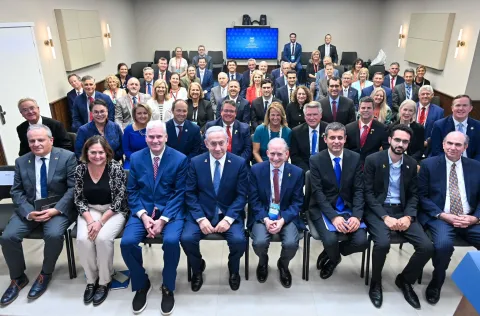
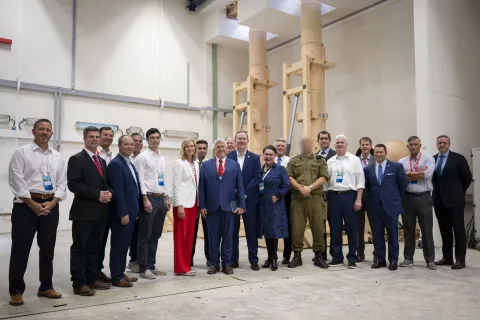
The trip began with a deep dive into Jerusalem’s thousands of years of layered history and significance as a spiritual center for Judaism, Christianity, and Islam.
In the evening, the delegation heard from Yaakov Katz, former editor-in-chief of The Jerusalem Post, on Israel’s domestic climate and evolving security challenges nearly two years after the October 7 terrorist attack. A late-night visit to the City of David revealed ancient pilgrimage roads and archeological sites dating back more than 2,000 years.
“Jerusalem’s history is alive in every stone,” Fedorchak said. “You can feel the weight of faith, resilience, and sacrifice here. It’s impossible not to see how this city’s story still shapes our world today.”
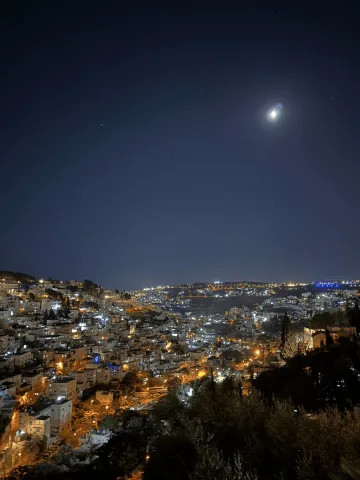
Day two began with a strategic briefing from Brig. Gen. (Res.) Nitzan Nuriel on Israel’s “seven-front war,” covering threats from Hamas, Hezbollah, Iran, Syria, Yemen’s Houthis, and beyond.
At an Israeli military base, Fedorchak met with the commander of the Arrow Interceptors and Launch Array Department to see the Arrow-3 missile defense system—developed jointly by the U.S. and Israel and funded in part by Congress. The system successfully intercepted a missile from Yemen the night before the visit, underscoring its real-time role in protecting civilians.
The delegation also toured Yad Vashem Holocaust memorial, met with Prime Minister Benjamin Netanyahu to discuss the war in Gaza and U.S.-Israel cooperation, and received additional briefings from former heads of Israel’s air defense and military intelligence on Iran’s role in fueling regional instability.
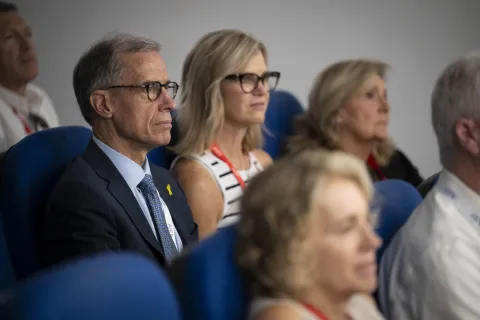
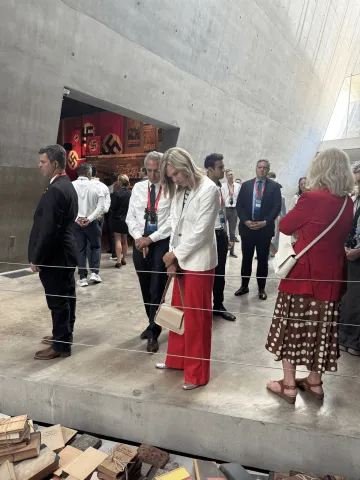
The next day, the delegation explored Jerusalem’s Old City, including the Southern Wall excavations, the Western Wall—where Fedorchak joined the tradition of leaving a prayer note—and the Church of the Holy Sepulchre, one of Christianity’s holiest sites.
Later, the group met with Opposition Leader Yair Lapid for a candid discussion about Israel’s political landscape and prospects for peace. At Rafael Advanced Defense Systems, the delegation saw next-generation technologies like the Iron Beam laser defense system and counter-drone capabilities—innovations that not only protect Israel but also contribute to U.S. defense readiness.
“The defense technology Israel is developing and testing in real time combat situations with the U.S. doesn’t just protect Israelis—it protects American troops, too,” Fedorchak said. “Seeing it up close makes clear why this relationship is mutually beneficial.”

The delegation traveled north on day four to visit sacred Christian locations around the Sea of Galilee, including Magdala, the Mount of Beatitudes, and the Church of the Primacy of Saint Peter.
They then moved to the Golan Heights, where dormant volcanic peaks overlook Syria and Lebanon. There, security experts explained the proximity of Hezbollah positions and Syrian instability, giving Fedorchak a direct view of the challenges Israel faces in defending its borders. Lunch with IDF soldiers and a meeting with humanitarian workers highlighted the intersection of security and aid efforts.

In southern Israel, the delegation visited towns and communities ravaged by the October 7 Hamas attacks. Fedorchak walked through burned homes, met survivors of the brutal attack who lost family members trying to defend their own homes, and saw the Nova Music Festival site where 400 young people were murdered, kidnapped, or injured.
The visit included a tree-planting ceremony to honor the victims—a solemn reminder of the stakes of U.S. support for Israel’s right to defend itself.
“There is no substitute for seeing the aftermath with your own eyes,” Fedorchak said. “The grief is deep, but so is the Israeli people’s hope and determination to survive. That resilience is something I will never forget. And their hope is evident in the large number of children and families that are everywhere in public places.”
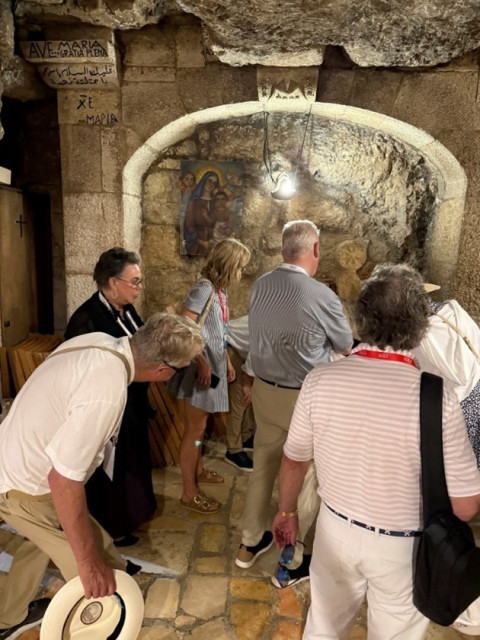

In Bethlehem, which is controlled by Palestinians, Fedorchak visited the Church of the Nativity, believed to be the birthplace of Jesus.
That evening, she met with the brother of a Nova Festival hostage still held in Gaza, hearing firsthand the anguish of families waiting for loved ones’ return. The night concluded with a performance by a survivor from Kibbutz Be’eri who lost both parents in the October 7 attack and has since turned to music as a way to share his story and inspire resilience.

On the final day of the trip, the delegation met with President Isaac Herzog at his residence in Jerusalem for a wide-ranging conversation about the war in Gaza, the need to strengthen Israel’s security partnerships, and opportunities for peace in the region. President Herzog emphasized the importance of bipartisan support from the United States and expressed gratitude for America’s role in helping Israel defend itself against terrorism.
Fedorchak also met with U.S. Ambassador to Israel Mike Huckabee, who provided a candid assessment of the U.S.-Israel relationship from a diplomatic standpoint. Ambassador Huckabee discussed how congressional engagement directly impacts Israel’s ability to deter threats, the role of American leadership in countering Iran’s influence, and the ongoing coordination between the two nations on military and intelligence matters.
The day concluded with a visit to Mount Herzl, Israel’s national cemetery, where Fedorchak paid tribute to fallen soldiers, including those killed since the October 7 attack.
###